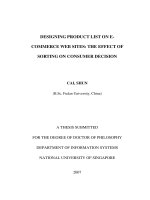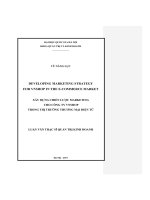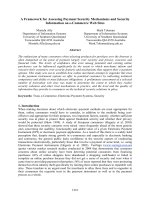Covid 19 spread on e commerce market
Bạn đang xem bản rút gọn của tài liệu. Xem và tải ngay bản đầy đủ của tài liệu tại đây (821.19 KB, 14 trang )
The Effect of COVID-19 Spread on the e-commerce market:
The case of the 5 largest e-commerce companies in the world
Mansour Abd Elrhim
PhD Researcher, Faculty of Commerce, Ain Shams University
Email: - Mobile: 00201121474347
Abdullah Elsayed
Lecturer in Business Administration, King Salman Institute
Email: - Mobile: 00201148518466
Abstract:
This paper attempts to investigate the effects of the spread of COVID-19 on global ecommerce companies, where the five largest e-commerce companies in the world were
chosen in terms of revenues and market value, and they were as follows: American
Amazon, Chinese Alibaba, Japanese Rakuten, German Zalando, United kingdom ASOS,
has been Measuring the prevalence of corona virus by "cumulative infections" and
"cumulative deaths" on a daily basis. Besides, it is measured through the values of both
the "new corona virus cases" and the "new corona virus deaths" daily, the dependent
variable reflects the response of the global e-commerce market to the impact of the
spread of the corona virus and is measured by the daily returns of the shares of ecommerce companies to the global financial markets. This was applied on a daily basis
from 15 March 2020 to 25 May 2020.
The results of the descriptive analysis of the returns of the e-commerce companies
showed that the companies achieve positive daily returns by calculating the average daily
returns. The results of the aggregate model, according to the Beta Standardized
Coefficients test, indicate the most important independent variables and an impact on the
returns of shares of global electronic trading companies, a variable (total deaths) was the
degree of its impact in the first rank, in the second rank a variable (total cases) and in the
third variable (new cases).
The percentage of the effect of coronavirus spread varied from one company to
another, depending on the country to which it belonged, where the American company
Amazon and the United kingdom company ASOS were "the cumulative cases of
infection are the most influential and this is consistent with that they are the most affected
countries of the coronavirus during the period of research, and the Chinese company
Alibaba and Rakuten company Japanese “Corona virus cases” were the most influential
in their share price returns, and the German company Zalando was the most influential
variable “cumulative deaths”.
Key Words: Coronavirus (COVID- 19), E-Commerce
1. Introduction:
The pandemic of COVID-19, the social dimension and staying at home,
has pushed consumers to head to online shopping. This affects the demand
and uncertain supply chain issues for the e-commerce industry. COVID-19
can also affect older merchants like Walmart, who are experiencing a drop in
1
Electronic copy available at: />
informal shopping, supply chain disruptions, an increase in the purchase of
basic toiletries, groceries, and other products.
The term -commerce oris referring to any sort of business transaction,
which involves the transfer of information through the internet E commerce
means using the transaction and or commercial transaction, which involve
exchange of value in return of product or services(Nakhate and jain,2020).
The World Trade Organization indicated that it is the right time for
e-commerce to save the world economy and that it is to intervene with vigor
and vitality and prove e-commerce of its importance and effectiveness in the
field of trade and online shopping (WTO,2020).
Shares of traditional trade have become volatile and in marked decline
due to the spread of COVID-19, and this will be a strong reason for the
willingness of each of these traders of these traditional markets to move
towards trade via the Internet in order to preserve the rest of its shares and
maintain its commercial field and its success in the market.
The global e-commerce industry report indicated that the impact of
COVID-19 on these sectors has been pervasive due to uncertainty in the
supply chain and consumer demand worldwide. E-commerce supply chains
are mainly stressful. In addition to closing factories in China, the United
States and other countries. The most affected part of the industry due to the
outbreak of COVID-19 is electronics products as China accounts for most of
the cases of COVID-19 and according to the International Federation, the
country is the largest producer of electronics and its parts globally. A large
amount of China's imports of electronic parts that are assembled into
finished products, such as consumer electronic products and computers, are
then included. However, due to the factory shutdown, the electronics product
supply chain is now close to affecting the e-commerce electronics industry.
(Fernandes,2020).
E-commerce in various regions such as America, Europe, Asia and the
rest of the world has been affected by the new COVID-19 epidemic.
Countries in which most cases were recorded include Italy, Spain, Germany,
France in Europe and China in Asia. Chinese company Alibaba, a giant
provider of e-commerce services, has struggled to maintain growth rates
during the economic slowdown in its domestic market and faced the
uncertainty of coronavirus outbreaks. Major companies affected in the
2
Electronic copy available at: />
market include Alibaba Group Holding Ltd., Amazon.com, Inc., Qoo10 Pte.
Ltd. , JD.com, Walmart Inc. , Shopify, Rakuten Group, and eBay Inc. , And
others. For example, Amazon made some huge investment in one-day
shipping that has not yet been compensated. In 2019, her net income
decreased by 26% and freight costs increased by 46%.
So, this paper attempts to address the following questions:
What is the impact of the spread of the Coronavirus on the
volume of E-commerce?
2. Literature Review:
In this section, we try to present some previous literature for this
research. About the research that dealt with the impact of the Corona virus
and E-commerce.
(Hasanat,et al.,2020) aimed to find out the effect of coronavirus
(Covid-19) on internet business in Malaysia. . This search has been cleared
and the basic search has been done to get a better result. The results showed
that since the maximum number of products comes from China and the
maximum industries are closed, which means that there is no import and
export of the product.
(Nakhate and jain,2020) aimed to find effect of coronavirus on e
commerce. . Most of the kits are manufactured in China and hence,
dependability is remarkable. With effect of coronavirus, all the shipments
processes are hindered which lowered the e commerce growth of country
and state. The research paper here comprises of the impact of the corona
virus on the online business of India. On the analysing, it has found that
online businesses are seriously hampered due to this pandemic disease.
(Alber, 2020) aimed to verify the effects of the spread of the COVID -19
on stock markets.As the prevalence of coronavirus was measured with
cumulative cases, new cases, cumulative deaths, and new deaths. The
researcher relied on the application on the worst 6 countries (according to
the number of cumulative cases), during the period from March 1, 2020 to
April 10, 2020. The prevalence of coronavirus was measured in numbers per
3
Electronic copy available at: />
million of the population, while the stock market measured the return Δ in
the stock market index. The researcher concluded that the return on the stock
market seems to be more sensitive to COVID -19 cases than deaths, and to
cumulative indicators of coronavir virus more than the new indicators.
Besides, the durability check confirms the negative impact of the spread of
the COVID -19 on the stock market returns of China, France, Germany and
Spain, while these effects have not been confirmed for Italy and the United
States.
(Pandey and Parmar,2019) aimed To investigate the factors affecting
consumer’s online shopping behavior.The study results suggest that
consumers’online shopping behavior is being affected by several factors like
demographic factors, social factors, consumer online shopping experience,
knowledge of using internet and computer, website design, social media,
situational factors, facilitating conditions, product characteristics, sales
promotional scheme, payment option, delivery of goods and after sales
services plays an important role in online shopping.
(Elsayed and Elrhim,2020) aimed to investigating the effects of the
prevalence of COVID-19 on sectoral indices of the Egyptian Stock
Exchange, during the period from March 1, 2020 to May 10, 2020. Of the
cumulative cases of corona virus. The coefficient of determination between
the independent variables and the variable that belongs to 4 sectors is
(information technology and media and communications services 0.393,
industrial goods and services and cars 0.470 and health care and medicines
0.327 and basic resources 0.266).
(Ayittey, at al.2020) estimate that, without urgent global actions to
curtail the Wuhan 2019‐nCoV within the shortest possible time, China is
expected to lose up to $62 billion21 in the first quarter of the year, while the
world is likely to lose over $280 billion within the same period.15 This
conclusion compares closely to the World Banks estimation that even a
weaker flu pandemic, such as the2009 H1N1 viruses, could still wipe 0.5%
off global GDP, which amounts to approximately $300 billion.
4
Electronic copy available at: />
•
Comparing with literature, it’s important to pinpoint that:
1. This is the first study dealing with the impact of the spread of the
Corona virus on the volume of E-commerce and applying it to the 5
largest companies in E-commerce in the world In terms of revenue
and market value.
2. Most of the previous studies deal with the economic effects of the
COVID-19 epidemic, while this study studies its effects on the global
e-commerce market.
• The researchers chose the largest e-commerce companies in the world
in terms of revenues and market value. These companies, which
provide the majority of their businesses on the Internet, are limited
with annual revenues exceeding $ 1 billion.
Table (1): The revenues and market value of these companies were as follows:
Sorted by
revenue
company
Headquarters
Revenue
(billion
USD)
Fiscal
year
Number of
Employees
Market value
(billion USD)
107
2017
268,900
329.7
12.29
2017
26,000
204.8
1
Amazon
Washington, America
2
Alibaba
Zhejiang, China
3
Rakuten
Tokyo, Japan
6.3
2017
12,981
13.06
4
Zalando
Berlin Germany
3.28
2017
10,000
8.7
5
ASOS
London, UK
1.4
2017
7,500
4.8
Source : />
In light of the repercussions of Corona's misdemeanor, these companies
have shown expectations of their expected revenues in the coming years, as
follows:
Table (2): Expectations of future revenues for e-commerce companies
company
Headquarters
2020
2021
2022
2023
Amazon
USA
330,711
386,746
448,115
505,786
Alibaba
Rakuten
Zalando
China
Japan
Germany
519,372
671,065
834,509
1,046,942
1,423,889
7,633
1,616,054
8,905
2,016,036
10,033
2,497,850
11,109
36
41
46
31
ASOS
United kingdom
Source: />5
Electronic copy available at: />
Figures (1) to (4) illustrate the developments of Coronavirus spread during
the research period, as follows:
Figure 1: The New cases In the countries associated with the research
120000
100000
80000
60000
40000
20000
0
USA
China
Japan
Germany
United kingdom
Source: o/coronavirus
Figure 2: The Total cases In the countries associated with the research
1800000
1600000
1400000
1200000
1000000
800000
600000
400000
200000
0
USA
China
Japan
Germany
United kingdom
Source: o/coronavirus
6
Electronic copy available at: />
Figure 3: The New deaths In the countries associated with the research
3500
3000
2500
2000
1500
1000
500
0
USA
China
Japan
Germany
United kingdom
Source: o/coronavirus
Figure 4: The Total deaths In the countries associated with the research
120000
100000
80000
60000
40000
20000
0
USA
China
Japan
Germany
United kingdom
Source: o/coronavirus
7
Electronic copy available at: />
3. Descriptive and diagnostic statistics:
The following tables illustrate the descriptive statistics of the research
variables related to the returns of shares of five global e-commerce
companies, and the four independent variables of the incidence of Corona
virus, during the period from March 15, 2020 to May 25, 2020 as follows:
Table (3): Descriptive statistics of dependent search variables:
Variables
N
Mean
Median
Minimum
Maximum
-.0760.07
Amazon 49 0.0078 .00800
-.0590.057
Alibaba 49 0.0030 .00700
-.0500.079
Rakuten 49 0.0080 .00600
-.0740.124
Zalando 49 0.0134 .01100
49 0.0135
.01900
-.3470.34
ASOS
* Source: Data processing output using SPSS v.25.
Std. Deviation
Skewness
Kurtosis
0.026367
-.198-
1.399
0.024371
-.084-
0.105
0.027744
0.331
0.474
0.03925
0.666
1.644
0.099722
0.078
5.372
Table (4): Descriptive statistics of independent search variables:
Variables
USA
China
Japan
Germany
United
kingdom
N
Mean
Median
Minimum
new cases
72
24355.49
25638.50
847
total cases
72
781083.17
777485.50
0
Std.
Deviation
Skewness
Kurtosis
81740
11268.301
1.247
8.866
1706964
565047.962
.067
-1.413
Maximum
new deaths
72
1410.64
1416.50
15
3331
820.800
-.141
-.826
total deaths
72
43645.50
41877.00
73
99798
35310.674
.138
-1.494
new cases
72
82.56
13.50
0
3906
459.049
8.370
70.633
total cases
72
81131.39
82741.00
7
82985
9723.030
-8.411
71.146
new deaths
72
21.21
.00
0
1290
152.040
8.419
71.203
total deaths
72
4021.64
4632.00
3213
4634
669.775
-.176
-2.019
new cases
72
1606.22
169.00
0
100123
11775.550
8.481
71.956
total cases
72
9350.86
10966.00
226
16581
6174.257
-.235
-1.657
new deaths
72
33.13
11.00
0
1584
185.601
8.450
71.588
total deaths
72
378.78
272.00
24
3802
493.077
4.831
32.640
new cases
72
2447.08
1944.00
273
6933
1907.334
.892
-.269
total cases
72
120496.25
144733.00
4599
180328
57957.761
-.796
-.816
new deaths
72
116.93
106.00
0
333
87.470
.630
-.401
total deaths
72
4231.07
4590.00
9
8371
3111.085
-.106
-1.604
new cases
72
3640.04
3909.50
152
8681
1711.489
-.157
.088
total cases
72
118993.76
117142.00
1140
261598
89552.931
.111
-1.455
new deaths
72
512.31
496.00
15
1172
332.206
.241
-.971
total deaths
72
17388.54
18243.00
28
36793
13321.011
-.011
-1.574
* Source: Data processing output using SPSS v.25.
8
Electronic copy available at: />
4. Measuring Variables and Developing Hypotheses :
Corona virus spread measured by independent variables, cumulative
infections and cumulative deaths on a daily basis. Besides, it is measured
through the values of both the new Corona virus cases and the new Corona
virus deaths "daily. The dependent variable reflects the response of the
global e-commerce market to the impact of the spread of the Corona virus
and is measured by the daily returns of the shares of e-commerce companies
to the global financial markets. This has been applied. On a daily basis from
15 March 2020 to 25 May 2020.
This paper aims to test the following hypotheses:
The first hypothesis: "There is no significant, statistically significant
effect of the independent variables of the spread of the Coronavirus, which
are new cases of Coronavirus, new Coronavirus deaths, cumulative
infections and cumulative deaths on the returns of global e-commerce
companies.
The second hypothesis: "There is no significant, statistically significant
effect of the independent variables of the spread of the Coronavirus, which
are the cases of the new Coronavirus, new Coronavirus deaths, cumulative
infections and cumulative deaths on the returns of e-commerce companies
depending on the country to which they belong.
This means that alternative hypothesis
Ha: β # 0 versus null hypothesis
Hb: β = 0,
where β is the regression coefficient of the following functions:
- Corporate returns = α + β1) new cases) + β2 (total cases) + β1 (new deaths) +
β2 (total deaths) + ε
5. Testing Hypotheses:
Test First hypothesis: a multiple multiple regression equation was applied
to the four independent variables related to the spread of the Corona virus
and the dependent variable was the returns of the e-commerce companies in
question. The results were as follows:
9
Electronic copy available at: />
Table (5): Summary of multiple regression tables, the impact of covid-19 on global
e-commerce companies
Dependent
Variable
Model
Summary
R
R
Square
ANOVA
F
Coefficients of independent variables
Variables
Independent
Effect of
variables
Unstandardized
Standardized
B
Beta
Sig.
(Constant)
1
companies
returns
.702
.492
58.151
.000
390.9430
t
Sig.
5.917
.000
new cases
3
0.0163
0.213
2.211
.028
total cases
2
0.0170
7.327
9.771
.000
new deaths
0
0.1399
0.103
.886
.377
total deaths
1
0.2922
7.486
10.404
.000
* Source: Data processing output using SPSS v.25.
To explain the results of Table (5), we note the following: From Model Summary, the correlation coefficient (R) reached (.702) and
the determination coefficient equals (.492), and from ANOVA it turns out
that the regression model was significant because the calculated value of (F)
was (58.151) and it is statistically significant as shown by the value of sig)
Where it reached (000.) which is less than the level of significance (0.05),
indicating the significance of the regression model, and therefore we reject
the null or null hypothesis and accept the alternative hypothesis.
The results of the statistically significant mean for the independent
variables identified and affecting the dependent variable were significant
according to (T) test at the level of significance (0.05), where all the
independent variables were less than the level of significance (0.05), except
for the independent variable (new deaths) did not have an effect Morale
where the level of morale for him reached .377)) according to the test (T)
- The results of (Beta Standardized Coefficients) for the most important
independent variables and influences in the variable variable, total deaths,
were the degree of its effect and importance in the first rank, in the second
rank variable (total cases) and in the third rank variable (new cases).
The multiple regression equation was as follows:
companies returns = 390.94 + 0.0163 (new cases) + 0.0170 (total cases) +
0.2922 (total deaths).
10
Electronic copy available at: />
Test The second hypothesis: Multiple regression equations were applied to
each of the selected companies according to the country to which they
belonged, and the independent variables were cumulative infection cases,
cumulative deaths, new Corona virus cases, new Corona virus deaths "daily,
and the dependent variable, daily returns for the shares of e-commerce
companies. For financial markets, the results are as follows:
Table (6): Summary of multiple regression tables, the impact of covid-19 on global ecommerce companies according to the headquarters country.
Dependent
Variable
Model
Summary
R
R
Square
ANOVA
F
Coefficients of independent variables
Variables
Independent
Effect of
variables
Sig.
(Constant)
1
Amazon
0.967
0.936
160.95
0.00
USA
2
.642
0.413
7.72
.000
China
Rakuten
.892
0.795
42.73
.000
Japan
4
.976
0.953
220.71
.000
Germany
.950
5
United
kingdom
0.902
100.78
.000
t
Sig.
75.419
.000
.003
.198
2.634
.012
total cases
1
.001
2.204
5.448
.000
new deaths
3
.076
.313
3.145
.003
total deaths
2
.017
1.678
4.367
.000
2.595
.013
new cases
1
352.321
.142
7.835
3.983
.000
total cases
2
.007
7.604
3.876
.000
new deaths
3
.044
.811
4.186
.000
total deaths
0
.004
.222
1.699
.096
71.973
.000
7.161
new cases
1
.000
4.956
2.039
.047
total cases
2
.000
1.398
6.086
.000
new deaths
0
.011
2.948
1.172
.247
total deaths
0
.003
1.782
1.933
.060
28.822
.000
31.041
new cases
0
.000
.030
.565
.575
total cases
2
.000
.395
2.405
.020
new deaths
0
.006
.057
.928
.359
total deaths
1
.002
.646
4.157
.000
12.861
.000
(Constant)
ASOS
Beta
4
(Constant)
Zalando
B
new cases
(Constant)
3
Standardized
1797.158
(Constant)
Alibaba
Unstandardized
1055.178
new cases
0
.014
.043
.433
.667
total cases
1
.035
3.148
2.492
.017
new deaths
0
.333
.189
1.992
.053
total deaths
0
.164
2.387
1.948
.058
* Source: Data processing output using SPSS v.25.
11
Electronic copy available at: />
For the interpretation of the results of Table (6), we note the following: 1- The results of the multiple regression for the summary of the multiple
regression model for all e-commerce companies were as follows:
Amazon USA: Correlation coefficient (0.967) and coefficient (0.936).
- Alibaba Chinese company: The correlation coefficient (.642) and the
determination coefficient (0.413).
- The Japanese Rakuten Company: The correlation coefficient (.892) and the
determination coefficient (0.795).
- German company Zalando: The correlation coefficient (976) and the
determination coefficient (0.953).
United kingdom ASOS company: The correlation coefficient (950) and the
determination coefficient (0.902).
2- The results of the statistical significance of the multiple regression models
for all company countries were significant according to (F) test at the level
of significance (0.05), where all models were less than the level of
significance (0.05) indicating the significance of the regression models.
3- The results of the statistical significance of the independent variables
affecting the dependent variable were significant according to the test (T),
where the total variable for all companies was less than the level of
significance (0.05), and the degree of no significant effect of the other
independent variables differed from one company to another.
4- The results of (Beta Standardized Coefficients) were the most important
and influential independent variables in the dependent variable, as the effect
of the effect of coronavirus spread varied from one company to another,
depending on the country to which they belong, where the American
company Amazon and the United kingdom company ASOS were
"cumulative cases of infection" They are the most influential and this is
consistent with the fact that they are the countries most affected by the
coronavirus during the period of research, and the Chinese company Alibaba
and the Japanese company Rakuten were the "new cases of the Corona
virus" the most influencing the returns of their stock prices, and the German
company Zalando was the most influential variable is "cumulative deaths".
12
Electronic copy available at: />
6. Summary and Concluded Remarks:
This paper aimed to verify the effects of the spread of the Corona virus on
global e-commerce companies. Prevalence of coronavirus was measured with
cumulative cases, new cases, cumulative deaths, and new deaths. On a daily
basis from March 15, 2020 to May 25, 2020. This was applied to the five largest
e-commerce companies in the world in terms of revenue and market value,
while e-commerce companies are measured by the daily returns of shares traded
in global financial markets. Most of the previous studies deal with the economic
effects of the COVID-19 epidemic, while this study studies its effects on the
global e-commerce market.
The results indicate that the global e-commerce market is affected by the
spread of the coronavirus and the independent variables were the most important
and influencing the returns of the shares of global e-commerce companies, the
variable (total deaths) was the degree of its impact in the first rank, and in the
second rank a variable (total cases) and in the third rank Variable (new cases).
The percentage of the effect of coronavirus spread varied from one company
to another, depending on the country to which it belonged, where the American
company Amazon and the United kingdom company ASOS were "the
cumulative cases of infection are the most influential and this is consistent with
that they are the most affected countries of the coronavirus during the period of
research, and the Chinese company Alibaba and Rakuten company Japanese
“Corona virus cases” were the most influential in their share price returns, and
the German company Zalando was the most influential variable “cumulative
deaths”.
7. References:
Alber, N. (2020). The Effect of Coronavirus Spread on Stock Markets: The
Case of the Worst 6 Countries. Available at SSRN 3578080.
Ayittey, F. K., Ayittey, M. K., Chiwero, N. B., Kamasah, J. S., & Dzuvor, C.
(2020). Economic impacts of Wuhan 2019‐nCoV on China and the
world. Journal of Medical Virology.
13
Electronic copy available at: />
Coronavirus, O. E. C. D. (2020). The World Economy at Risk. OECD
Economic Outlook, Interim Report March.
Elsayed, A., & Elrhim, M. A. (2020). The Effect Of COVID-19 Spread On
Egyptian Stock Market Sectors. Available at SSRN 3608734.
Fernandes, N. (2020). Economic effects of coronavirus outbreak (COVID19) on the world economy. Available at SSRN 3557504.
Hasanat, M. W., Hoque, A., Shikha, F. A., Anwar, M., Hamid, A. B. A., &
Tat, H. H. (2020). The Impact of Coronavirus (Covid-19) on EBusiness in Malaysia. Asian Journal of Multidisciplinary
Studies, 3(1), 85-90.
Nakhate, S. B., & Jain, N. (2020).The Effect of Coronavirus on E
Commerce. Studies in Indian Place Names, 40(68), 516-518.
Pandey, A., &Parmar, J. (2019).Factors Affecting Consumer's Online
Shopping Buying Behavior. In Proceedings of 10th International
Conference on Digital Strategies for Organizational Success.
/> />o/coronavirus/country/egypt/
/> /> />
14
Electronic copy available at: />









